by Carol Bean, Ranti Junus, and Deborah Mouw
(If you have a conference report in the form of a blog posting, Web page, etc., then please consider linking it from the comments of this article. –Ed.)
Report from Code4LibCon 2008 by Carol Bean
In fall of 2005, the possibility of having a Code4Lib conference was raised on the Code4Lib mailing list. This had never been done before, but many on the list were inspired by the Access Hackfest conferences and pushed forward with organizing the first Code4Lib conference, held a few months later in February 2006. There were 85 attendees and 15 speakers. In 2007, the registrations increased to 140, with a waiting list, and a pre-conference workshop was added. For the 2008 conference, there were 220 attendees (and a waiting list again), with 22 presentations, 3 pre-conference workshops, and an all-day Koha Camp. In the true spirit of Code4Lib, the 2008 conference also included an ad-hoc un-pre-conference for early arrivals who were not attending one of the pre-conference programs.
While the conference has grown, the basic format has not. The schedule itself is one-track, with times left open for breakout sessions and for five minute “lightning talks” by anyone at the conference on any topic at all. The conference planning has been through a separate mailing list, Code4LibCon, which anyone can join. This list is where proposals for hosting the conference and proposals for presentations are submitted and where discussions take place about the conference itself. Issues are decided by consensus within the mailing list, but proposals are voted on by everyone registered at the Code4Lib.org site.
In 2007, Oregon State University Libraries sponsored two scholarships to the conference: the 2007 Code4Lib Conference Scholarship for Women and the 2007 Code4Lib Conference Minority Scholarship. The OSU Libraries sponsored two scholarships again this year: the Code4Lib Diversity Scholarship, to be awarded to a member of a principal minority group, and the Code4Lib Gender Diversity Scholarship, to be awarded to a woman. This year’s recipient of the Diversity Scholarship was Ranti Junus, the Systems Librarian for Web Services and Electronic Resources at Michigan State University Libraries. Deborah Mouw, the Electronic Resources Specialist at Western Michigan University Libraries, was the recipient of the Gender Diversity Scholarship.
While there are many blog postings from and about this year’s conference, as well as online versions of the presentations and lightning talks, the Code4Lib Journal asked the two scholarship recipients to submit a summary of their experiences at the conference. These are of particular interest since it was the first Code4Lib conference for each of them. Here are their reports.
Code4Lib Conference Report by Ranti Junus
Un-conference
The conference began with an “un-conference” – an open-ended discussion of issues, raised by the attendees themselves. This event was held for the benefit of attendees who came early but were not necessarily participating in the pre-conferences. People could come and go as they wished; there was no need to stay for the whole time. Many of the attendees shared information about a project they are working on, a tool or solution that they use, or an application or project that might be useful for their library. A topic could continue into lengthy discussion about technical issues or other ideas that are related to it.
This un-conference event, in a way, was quite similar to the Lightning Talks sessions, except people don’t have to register first and we can have discussions about the topics. The smaller group size at the un-conference also made the conversations and discussions easier to manage. During this session, I learned about a couple of projects that I’d like to try my hands on: OAI-PMH in xquery (an open source project from Princeton University Library) and the Drupal based Miami University Library (OH) experimental catalog. A list of the topics discussed (including related websites) is publicly available on Google Docs.By coincidence, my conference roommate and I both own the XO laptop from the One Laptop per Child project and Chumby, an open-source, wireless-based gadget. We decided to bring them both with us to the conference and I had a chance to show them off during the un-conference.
Preconferences
The Code4Lib preconferences included:
- Evergreen – An open source library automated system developed by the Georgia Public Library Service and its PINES (Public Information Network for Electronic Services) program
- Zotero – A browser tool for note management developed at George Mason University
- LibraryFind – An open source meta search developed by the Oregon State University Libraries
I attended the LibraryFind preconference because this is an application that I’d like to work on back at my library to serve our electronic resources collections. With the number of digital collections and electronic resources we have, including course and subject guides, we need a tool like this to help get our search results with proper categorization in one user interface.
Keynotes
The Code4Lib Program Committee probably didn’t do this intentionally, but I found the sequence of keynote speakers complemented one another. We started with Brewster Kahle from the Internet Archive discussing collections and content, followed by Karen Coyle on Day 2 with collections’ metadata and its issues, and finally, John Udell from the Microsoft on Day 3 speaking on library roles and the need for library expertise in helping curate the data being published on the Web.Brewster Kahle from the Internet Archive discussed the Internet Archive background, its collection development activities, and how it has grown to include not only web pages, but also moving images and audio files. He also discussed their new initiative, the Open Library, and its operation. I am interested in the mission of this initiative and started writing a proposal to our library administration to share our special collections records with the Open Library. We’ll see.Karen Coyle discussed the RDA in RDF: its background, status, issues, and what’s next. This is something that I still need to learn more about. Jon Udell discussed how libraries could also be the center of information production as well as the center of information consumption.
Scheduled Sessions
One thing that strikes me about Code4Lib is the way the sessions are organized. Unlike the typical conferences I’ve attended, Code4Lib sessions are presented in one continuous thread instead of dividing into several concurrent sessions on different tracks. This model allows everybody to hear the same sessions without missing any of them. What makes this method unique is that the community voted for the topics they’d like to hear a few weeks before the conference opened. A complete conference schedule is available at the Code4Lib web site.
Breakout Sessions
Breakout Sessions were done on Day 1 and Day 2, and attendees could pick and choose which topic they would like to participate in.
Day 1
On the first day, I participated in the Linked Data session. The first part of the discussion talked about the definition of linked data (wikipedia: “a term used to describe a recommended best practice for exposing, sharing, and connecting pieces of data on the Semantic Web.”) While I am familiar with the concept of exposing, sharing and connecting pieces of data, this is the first time I heard the term “linked data”.The main discussion then centered around the World Digital Library, a Library of Congress project that involves many rare, high-value, high-quality records from several national libraries around the world. A question arose about whether it’s worthwhile to open up the data so others could use it by writing their own applications, add tagging, and publish them. There are some issues that make this quite challenging: translation, controlled vocabularies, subject headings, copyright and licensing, reference metadata, URI of the records, and what they can make public.
Day 2
I went to the Drupal breakout session on Day 2. There were quite a number of participants in this session. We talked about libraries that implemented Drupal for their website, as well as Drupal-related projects, useful modules, and themes. A lengthy discussion focused on training for content providers. Besides in-house training, other suggestions included utilizing wikis and subscribing to the drupal4lib mailing list. One attendee also suggested training content providers on how to think like the “Drupal model.” Basically, content providers would need to know how Drupal organizes the content in order to understand how the content would be presented on the website.Users management (authentication and authorization) was also discussed. Drupal is capable of creating groups of users, where each module can be assigned to certain users. This also requires deciding whether or not users can access/edit static and/or dynamic content. For authorization, it is preferable to make it as simple as possible. Resources mentioned during this breakout included:
- Drupal4Lib – A mailing list
- drupalib – “A place for library drupallers to hang out”
- Groups.Drupal – A library-specific Drupal group
- Drupal modules such as CCK, IMCE (image/file uploaders), FCK editor (a WYSIWYG editor), interwiki (to create links to wiki websites), taxonomy, Views (to control the presentation of the content), and Shibboleth (to facilitate single sign-on; it’s not compatible yet with Drupal v.6 as of the meeting time)
I also managed to participate in the Future of Code4Lib session for the last 15 minutes of the meeting. So far, the general consensus from the participants is to still limit the number of attendees and keep the current conference format.
Lightning Talks
The Lightning Talks sessions were one of my favorites. Each of the 5-minutes talks gave me just enough information to encouraged me to explore them further. Now my head is brimming with ideas. The ones that caught my attention attention the most were:
- Jester, a javascript API for RESTAPIs that uses Rails
- Faceted Backup OPAC
- Jangle, a RESTful web framework for building web services for library systems
- Bringing sheet music to life, by Andrew Bullen (Illinois State Library), where he used music OCR software to digitize sheet music and create audio files from them.
What I got from the conference
It has been my experience that at most library conferences Web developers are a rather small minority. There were few opportunities at the other library conferences to discuss technical aspects of projects or development topics. The Code4Lib conference provides a venue where developers can swap experiences. This gave me exactly what I needed: more technical information and discussion of information management projects.
Conference Report by Deborah Mouw
Overview
Brewster Kahle, the founder of the Internet Archive, kicked off the 2008 Code4Lib Conference. Kahle’s charge was for all those gathered at the conference to work together to build a digital library together now. This keynote set the tone for the rest of the conference and the presentations that followed did not disappoint.The next 3 days were full of fascinating presentations on topics ranging from the latest database technology to the best way to manage an open source project. Excitement was infused in the highly flexible and participatory schedule, featuring many twenty minute scheduled presentations as well as the now legendary “lightning talks.” The long days left conference attendees tired but excited and often discussions lasted late into the night at various restaurants and brew-pubs around downtown Portland.Pre-conferences for Code4Lib started on February 25th and the conference proper ran from February 26 through February 28. The pre-conferences included workshops on Evergreen, LibraryFind and Zotero, as well as Koha Camp and an “Un-Pre-Conference” where all those who didn’t get a chance to sign up for a pre-conference workshop could use the time to meet and discuss projects and issues in an informal manner. I was able to attend the “Un-Pre-Conference” for a short time and get a glimpse of such projects as dbWiz, BiblioCommons and the Open Library project.One of the major themes of the conference this year was how do we leverage what we already have (ILS’s, MARC data) to create something new and useful for our users. The tension between limited resources and increasing expectations from users has forced library technologists to think creatively of how to make the most out of their own technology as well as how to spread development costs as far as possible. One presentation where this tension was discussed was the presentation by Emily Lynema and Terry Reese entitled “DLF ILS Discovery Interface Task Force API recommendation.” The Digital Library Federation created a task force to investigate creating standards for ILS’s to make their data available via an API. This topic was further discussed in a break-out session where discussion centered around the incredible need for such an API and how to get vendors to buy in to this recommendation.
This year’s conference was also filled with presentations on newly developed systems for various library related tasks. Some of these projects included two MODS editors using XForms developed by Winona Salesky at the University of Vermont and Michael Park at Brown University, a content management system to assist with the creation of course-specific library guides developed at Oregon State University, a metadata registry being developed at Cornell University and a tool to publish digital collections and exhibitions (Omeka) developed at the Center for History and New Media at George Mason University. There were also many presentations on the progress of older projects, including the Wayback Machine and Zotero.At the end of the third day of the conference, all those who spoke either in a scheduled presentation or at a lightning talk were asked to raise their hands. The participatory nature of the Code4Lib community and conference was evident when more than half of those in the room had a hand raised. I hope that this participatory nature continues throughout the future of Code4Lib and that those new to the community (such as myself) can become active members in this exciting group of people.
Keynotes
In the first day’s keynote address, Brewster Kahle unveiled his “big idea” to create a digital library free to all. Kahle outlined four steps to creating this digital library: scanning, selecting, building the catalog and, finally, allowing access to the books. Kahle also talked about some of the initiatives started at the Internet Archive, including the Internet Archive Bookmobile, a moveable machine that downloads, prints and binds a book on demand.
The second day’s keynote was done by Karen Coyle, a library consultant, on RDA in RDF and the work of the Dublin Core Metadata Initiative to help make RDA (Resource Description and Access) useful and usable. Karen pointed out some of the major flaws of RDA and charged the room of conference attendees to get involved in the discussions of the DCMI/RDA Task Group, as the technical voice was one that was needed in that conversation.
The third and final day began with a keynote by Jon Udell, an evangelist at Microsoft, who believes that librarians of the future would become “guild navigators for infospace.” This means that librarians will be critical in helping users create, organize and find information on the web. He had a charge especially to those in public libraries to move beyond helping patrons use computers and the internet to find information, to also help them upload, organize, tag and otherwise make accessible their own information creations.
About the Authors
Carol Bean is a member of the Code4Lib Editorial Committee.
Ranti Junus is the Systems Librarian for Web Services and Electronic Resources at Michigan State University Libraries. She is the 2008 recipient of the OSU / Code4lib Diversity Scholarship.
Deborah Mouw, the Electronic Resources Specialist at Western Michigan University Libraries, is the 2008 recipient of the OSU / Code4lib Gender Diversity Scholarship.



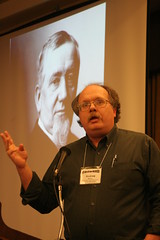
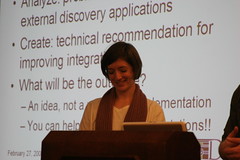
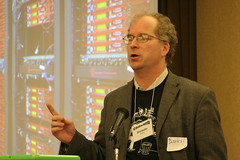
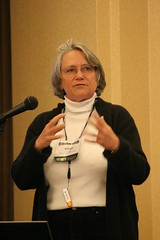
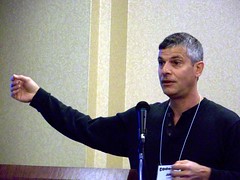

Taking Diversity to the Next Level – Library Hat, 2017-12-18
[…] Mouw, “Conference Report: Code4LibCon 2008,” The Code4Lib Journal, no. 2 (March 24, 2008), http://journal.code4lib.org/articles/72. […]